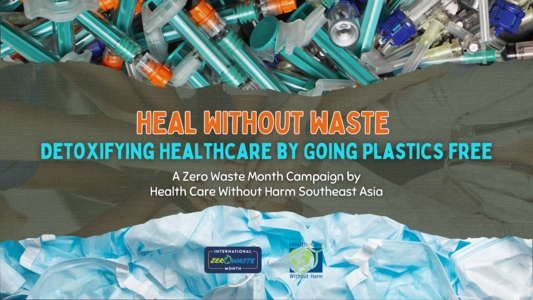10 signatures reached
To: Senate, Congress, Energy Committee, DENR, DOH
HCWH's Position Statement on the proposed bill establishing waste-to-energy technologies

We urgently appeal to policymakers to adopt preventive approaches as the cornerstone of efforts to reduce risks from chemicals and waste. And more importantly, policymakers should reject the proposed waste-to-energy legislation in the Philippine Congress and Senate, urging a prioritization of community health and safety and the exploration of alternatives with minimal environmental impact.
Full position statement: https://drive.google.com/file/d/1gLWBRLIFbLnngq5zYJjB6fJSi1QNAdJW/view
Full position statement: https://drive.google.com/file/d/1gLWBRLIFbLnngq5zYJjB6fJSi1QNAdJW/view
Why is this important?
There is an urgent need for the health sector to rise up and support the fight against false solutions to plastic pollution.
Global waste generation is set to double from 2015 to 2025, reaching over 6 million tonnes per day, with a projected increase to 11 million tonnes per day by the next century. In the Philippines, 362,000 metric tons of waste and 280 metric tons of medical waste are generated annually, posing challenges for proper waste management and segregation.
Focusing on sustainable alternatives over disposal can reshape consumption habits and lead to better waste reduction outcomes. The Philippine Clean Air Act of 1999 clearly indicates the rights of Filipinos, including the right to breathe clean air, the right to utilize and enjoy all natural resources according to the principle of sustainable development, and the right to be informed of the nature and extent of the potential hazards of any activity.
Incineration, also known as waste-to-energy, thermal treatment, energy-from-waste, and energy recovery, is not an effective solution to the waste management challenges and plastic pollution crisis. Beyond the health impacts and environmental degradation, false solutions, including WTE technology, do not effectively address waste disposal challenges and energy generation.
Health Care Without Harm Southeast Asia, therefore, states our opposition to this bill. We are deeply concerned about the potential health and environmental risks associated with reintroducing incineration technologies, such as waste-to-energy facilities, for dealing with municipal waste, including medical and infectious waste.
We urge for preventive measures to be taken, a just transition to be provided, and a precautionary approach to be supported in waste management.
Global waste generation is set to double from 2015 to 2025, reaching over 6 million tonnes per day, with a projected increase to 11 million tonnes per day by the next century. In the Philippines, 362,000 metric tons of waste and 280 metric tons of medical waste are generated annually, posing challenges for proper waste management and segregation.
Focusing on sustainable alternatives over disposal can reshape consumption habits and lead to better waste reduction outcomes. The Philippine Clean Air Act of 1999 clearly indicates the rights of Filipinos, including the right to breathe clean air, the right to utilize and enjoy all natural resources according to the principle of sustainable development, and the right to be informed of the nature and extent of the potential hazards of any activity.
Incineration, also known as waste-to-energy, thermal treatment, energy-from-waste, and energy recovery, is not an effective solution to the waste management challenges and plastic pollution crisis. Beyond the health impacts and environmental degradation, false solutions, including WTE technology, do not effectively address waste disposal challenges and energy generation.
Health Care Without Harm Southeast Asia, therefore, states our opposition to this bill. We are deeply concerned about the potential health and environmental risks associated with reintroducing incineration technologies, such as waste-to-energy facilities, for dealing with municipal waste, including medical and infectious waste.
We urge for preventive measures to be taken, a just transition to be provided, and a precautionary approach to be supported in waste management.
